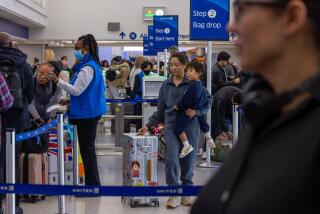Fast-food workers protest for higher wages in Los Angeles
Fast-food protests that started in New York spread to Los Angeles and other cities across the nation Thursday as workers called for higher wages and the chance to unionize.
Dozens of fast-food workers and supporters marched outside a South Los Angeles Burger King at 6 a.m., chanting their demand for a $15-an-hour minimum wage.
Holding signs with slogans such as “Burgers and Lies,” “Yo Quiero $15,” and “Lovin’ a Living Wage,” they began moving into formation before sunrise, headlights speeding by on the 110 Freeway behind the restaurant in the Brodway-Manchester neighborhood.
As the sun slowly rose and honks from passing passing cars increased, the employees and protest organizers from the Service Employees International Union, many decked out in “Fight For 15” T-shirts, snaked around the corner at Broadway and Century Boulevard.
The fast-food protests began in New York last November. There have been three protests in New York since then, and they have spread to Chicago and other cities. Thursday’s protest is to mark the first for fast-food workers in Los Angeles and other cities.
“This is our fourth strike in New York, and now we have 50 cities striking with us,” said Tyeisha Batts, 27, one of the protesters, who has worked in fast food for six years. “I’m ready for a change.”
The Los Angeles area has 181,595 fast-food workers, earning a median hourly wage of $9, according to protest organizers from SEIU. They say – pointing to an MIT living wage calculator – that an adult living in the area with one child needs to earn $23.53 an hour full time to afford basic necessities.
One worker who planned to protest told KTLA-TV early Thursday morning that it’s unfair that some of his colleagues have been in the industry for more than 20 years “and they still earn 8 bucks an hour.”
“They have a family to feed and everything….They have two, three jobs and things just shouldn’t be like that,” he said.
The protests come as more workers in blue- and white-collar jobs begin to agitate for better working conditions. But the fast-food protests are unique because they are not targeting one employer or company, but a whole industry.
Workers were expected to protest outside a number of fast-food outlets, including Wendy’s, McDonald’s, Burger King and Subway.
The fast-food industry used to employ mostly younger people just trying to make some extra money as they went through school. Now, workers are older and depend on the work to feed families. Analysis by the Economic Policies Institute shows that the average age of minimum-wage workers is now 35, and that 88% are 20 and older.
“This morning, I’m out here taking a stand for all the fast-food workers around the world,” Derrick Langley said. “If you’re not going to stand up for yourselves, we will.”
But industry groups such as the International Franchise Assn. said protesters’ goals are “unrealistic.”
Individual franchisees, not the bigwigs at corporate headquarters, determine wage levels for workers, according to the group. And many such operators are contending with thin margins made worse by a lagging economy, high commodity costs and soaring energy costs, according to the group.
“Mandating increased wages would lead to higher prices for consumers, lower foot traffic and sales for franchise owners, and ultimately, lost jobs and opportunities for employees to become managers or franchise owners,” Steve Caldeira, the association’s chief executive, said in a statement.
ALSO:
Yosemite fire: Hundreds more crew members added to fire lines
Woman possibly pushed out of car on 210 Freeway, is hit, killed
Hawthorne man charged with murder in death of 14-month-old boy
Twitter: @tiffhsulatimes
More to Read
Sign up for Essential California
The most important California stories and recommendations in your inbox every morning.
You may occasionally receive promotional content from the Los Angeles Times.












